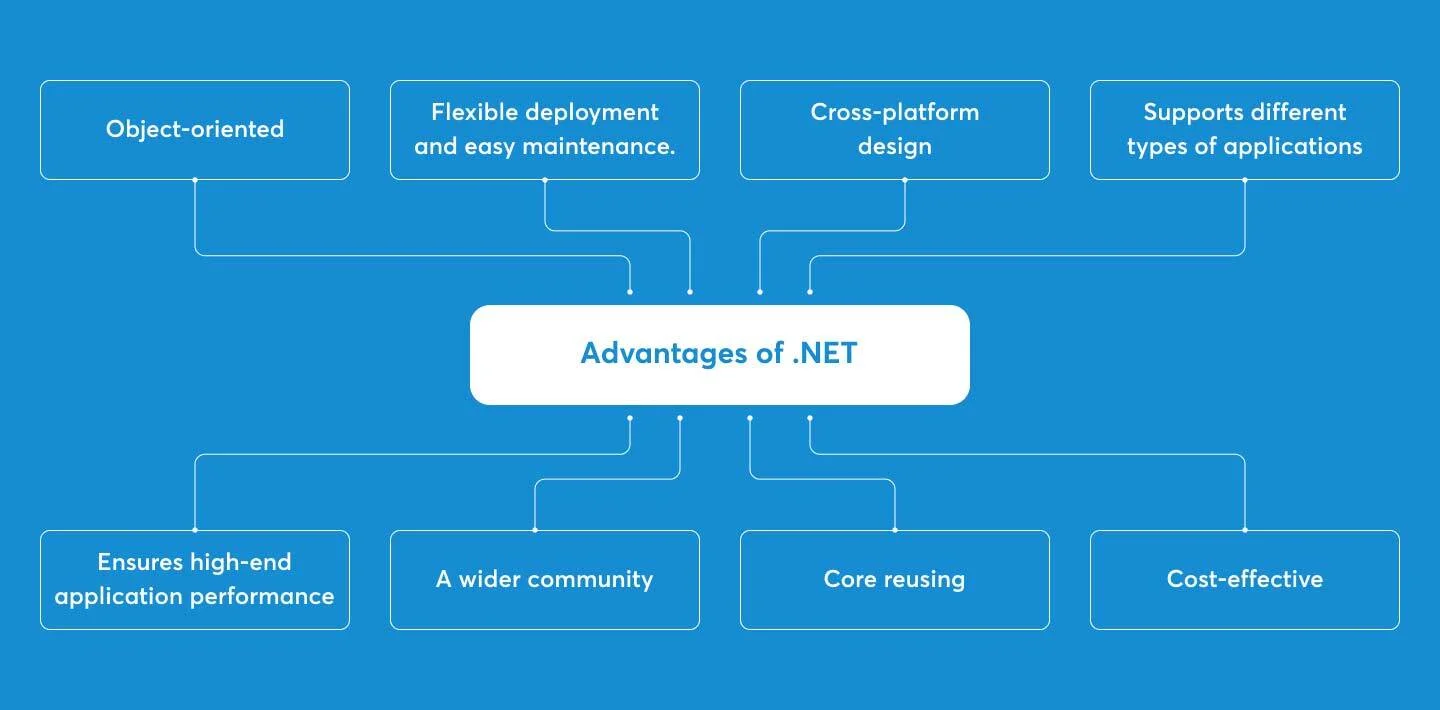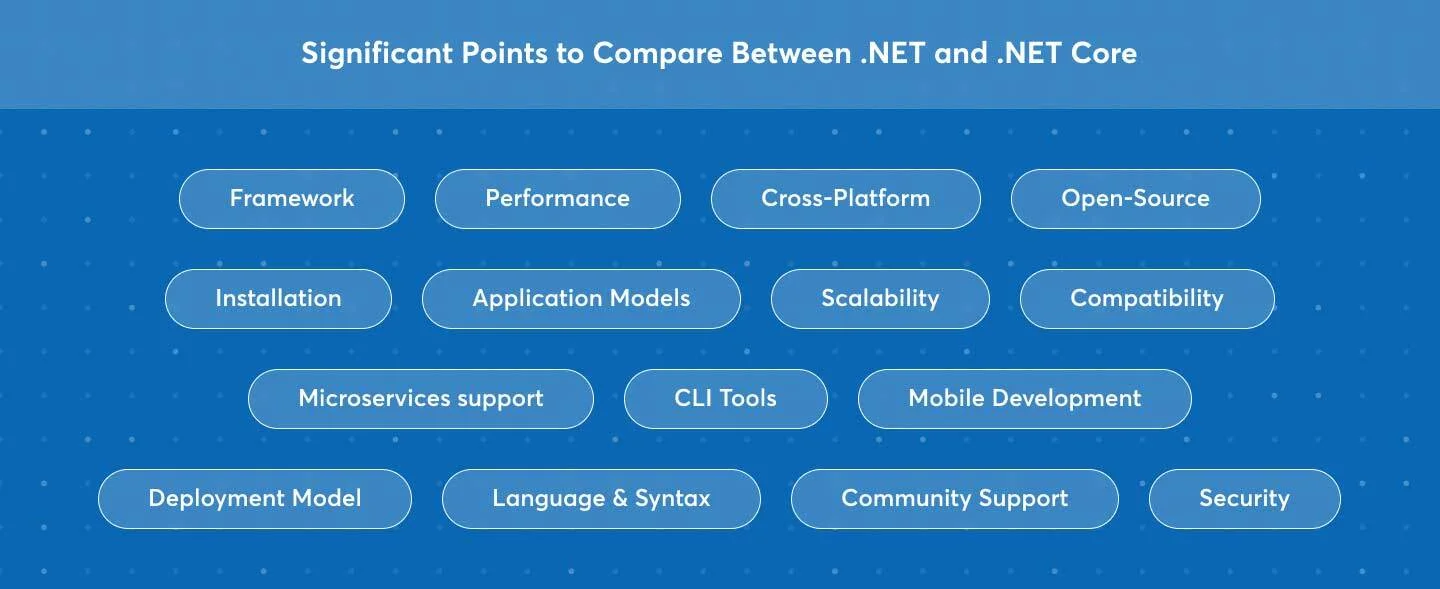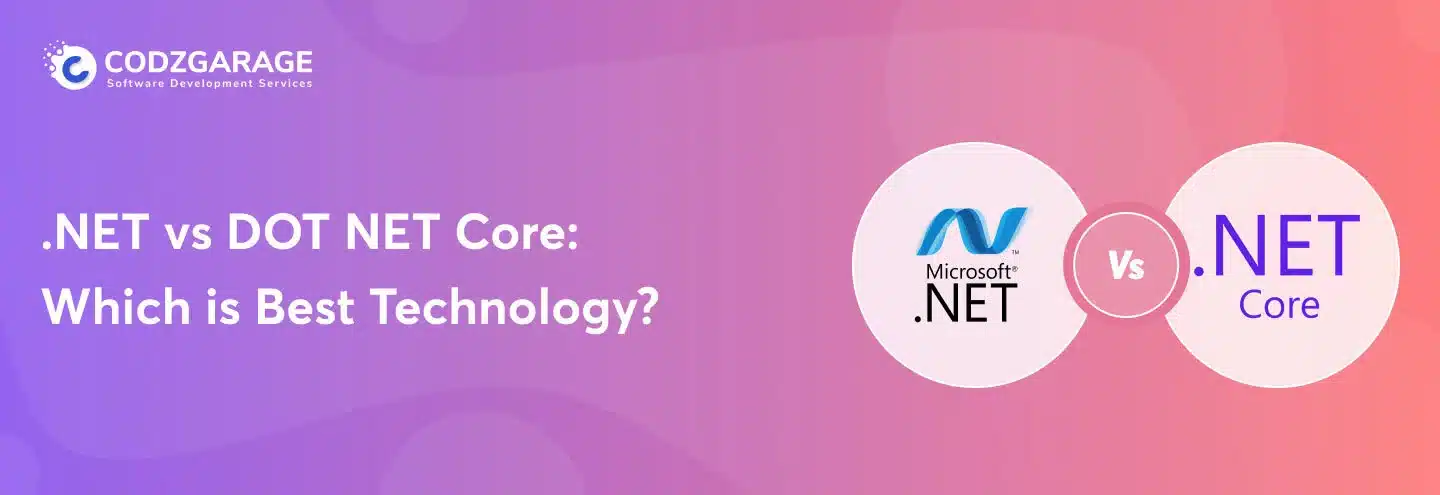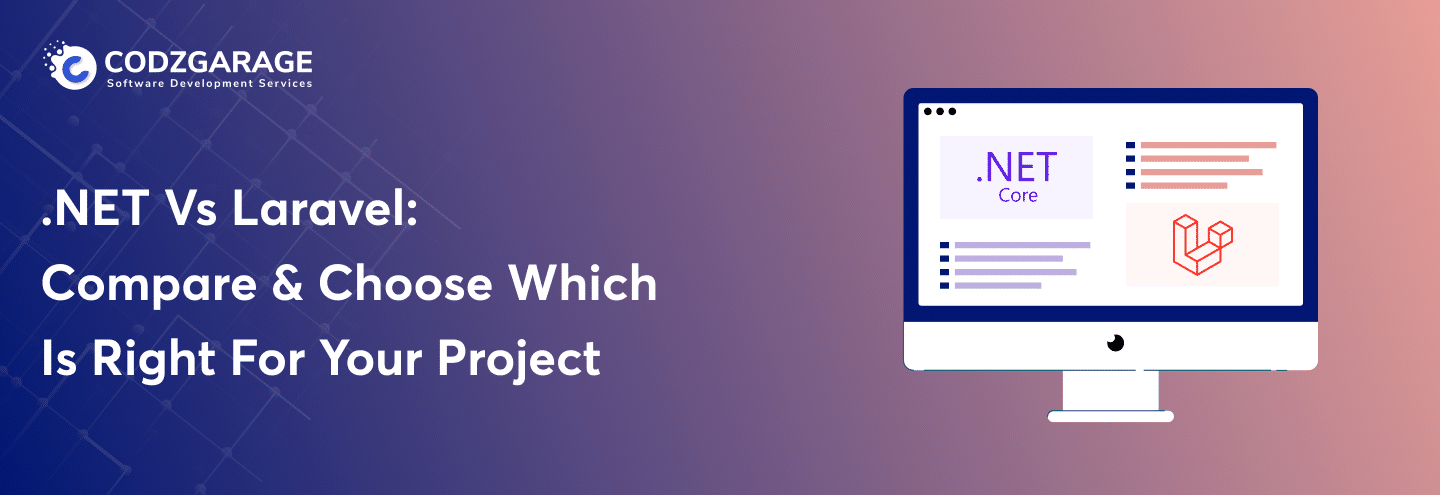-
2186
.NET Vs. Dot Net Core: Choose What’s Right for Your Next Project
Both .NET and .NET Core are part of the .NET Framework, and they are good at app development. But what if you have to choose one between these two technologies? That’s where you need to compare the two technologies.
Are you all over the map when choosing between .net vs .net core? Keep concerns at bay–as it happens to the best of us. As their names suggest, both technologies seem the same but are for different purposes. Explore these blogs to understand what differentiates ASP.NET and .NET Core.
As the names suggest, .NET and .NET Core are slightly different, and the variety in their attributes is way more different, just like when we compare .NET to Java and others. They are two different technologies for various uses; hence, you need to know these technologies if you are considering using one of them for your next project.
We’ve come up with this informative guide containing thorough information about .net vs .net core, along with their key pros that’ll help you be aware and make the right decision while choosing one for building high-performance applications. Let’s look up and down!
Codzgarage is the leading web development agency with core expertise in web technologies, like DOT NET and .NET Core developmentWe help you choose the right tech stack for your project and build quality projects for your needs.Contact us today for more information.
We’ll explore every aspect of .NET and .NET Core; however, let’s get started from the basics first for a detailed understanding. Knowing both technologies from the route aspects can lead to a better understanding of things needed for web development. Learning step-by-step about .NET vs Dot NET Core will help make a better decision.
What is Dot Net?
.NET is an open-source, high-performance cross-platform framework for creating and running different applications. .NET allows you to use multiple languages, libraries, and editors to create web, mobile, and desktop applications. Using .NET, you can create games, IoT, and more. Developed on a high-performance runtime environment, .NET is used to build a variety of high-scale applications.
The initial version of the .NET framework (.NET 1.0) was launched dated back to the year 2002. Since that very time, the framework has evolved significantly. The most recent version of .NET is .NET 4.7.2, got released on April 30, 2018. The framework involves programming languages, libraries, and developer tools to build desktop and web applications.
Features of .NET
- Simple Programming model
- Straightforward and streamlined app development
- Automated resource management
- Multi-language support
- Portability
- Robust security
Advantages of Dot Net

- Object-oriented.
- Flexible deployment and easy maintenance.
- Cross-platform design
- Support multiple types of applications.
- Ensures high-end application performance.
- A wider community.
- Core reusing.
- Cost-effective.
Want to Create Breathtaking Software Using .NET Core?
We have a vetted team of engineers to help you create robust applications. Let’s connect today for better digital transformation.
What’s .NET Core?
ASP.NET is a well-known web development framework to develop web applications, and .NET Core is a part of it. Dot Net Core is a revolutionized version of the .NET framework that’s platform-agnostic and runs on multiple platforms, for instance, Windows, macOS, Linux, etc.
Anyone can utilize .NET Core to create a variety of applications, for instance, mobile apps, desktop, mobile, IoT, machine learning, games, and so on. .NET Core is created from scratch intending to make it modular, lightweight, fast as well as platform-agnostic.
.NET Core, initially released dated back to the year 2006 that’s only a revolutionized version of the previous Windows-only version of .NET. .Net Core features like next-level of functionality, cross-platform capability, docker container possibility, and uninterrupted assistance from Microsoft make this framework preferred by developers worldwide.
Features of .NET Core
- Open-source framework
- Cross-platform support
- Unified MVC & web API frameworks
- Dependency injection
- Innovatively advanced
- Increased security
Advantages of Dot Net Core
- Competency in creating, rendering, and running apps on multiple platforms, including Windows, macOS, and Linux.
- Open-source and community-oriented.
- Architected for testability.
- Unified story to create web API and web UI.
- Blazor enables you to use C# in the browser alongside JavaScript.
- Integration of modern, client-side frameworks and development workflows.
- Razor Pages allow coding to be page-focused, convenient, and more productive.
- A high-performance, lightweight, and modular HTTP request pipeline.
- Built-in dependency injection.
- Cloud-ready, environment-based configuration system.
Key Variables, Varying .NET From .NET Core
Didn’t understand the differences between .NET V/S .NET Core? Let us simplify this a little further. Microsoft’s .NET is a software development framework for creating and running Windows applications. .Net includes a programming language, libraries, and developer tools to build desktop and web applications.
Microsoft’s .NET Core, on the other hand, is an open-source, general-purpose development platform used to create cloud-based software apps to run on various platforms, including Windows, Linux, and macOS. This technology is also popular for helping businesses modernize legacy applications.
The key difference between both of the tech stacks is that the .NET Core is the latest version of the initial version of the .NET Framework that is ingrained with many advancements. .NET Core is a platform-agnostic, open-source framework optimized for modern app development requirements.
End-to-End Comparison of Dot Net Vs .Net Core
Now that we’ve understood the basics let’s dive deeper into our key purpose: performing an intensive assessment of dot .net vs .NET Core. We’ll look at the nuances, for instance, framework, performance, installation, deployment, and many others of .NET and .NET Core, to know which is right for your next project.

Framework
Let’s initiate the comparison of .NET vs .NET Core based on the framework.
.Net framework is a full-fledged framework for creating performance-rich applications. It offers comprehensive solutions for app development requirements for finance, UI, DB connectivity, API services, and so on.
.NET Core, on the other hand, is a platform where frameworks like ASP.NET Core as well as Universal Windows Platform completely rely on and expands the functionalities of the .NET Core platform.
Performance
When comparing .Net vs Net Core performance, the latter wins the race. .NET Core, because of its architecture, provides next-level of scalability and performance in comparison to .NET.
Contrary to the .NET Core, .NET Framework is less scalable, offering lower performance than the .NET Core. The latest version of this technology even works great with modern technologies.
Cross-Platform
.NET Core leaves .NET behind here as well when it comes to cross-platform competencies. Dot Net framework is only compatible with Windows OS (operating system) but nothing else.
On the contrary, .NET Core, based on the concept of “develop once, deploy anywhere,” possesses platform-agnostic attributes. It is compatible with various operating systems, for example, Windows, macOS, and Linux.
Open-Source
Let’s compare both .NET & .NET Core based on open-source capabilities. The former contains some of the open-source components, whereas the latter is an entirely open-source platform that runs on various platforms flawlessly.
Installation
There’s a difference between .NET and .NET Core when compared on the basis of the installation. The .NET owns single packaged installations along with a runtime environment for Windows. You need to hire an experienced team of .NET Developers to take your idea into successful action.
On the other hand, .Net Core is platform-independent; thereby, it requires to be installed independently.
Application Models
The .NET Application Model involves ASP.NET, WPF, and WinForms. On the contrary, the Application Model of .Net Core has asp.net and windows universal applications.
Scalability
Both .net and net core are different in scalability. The former is less capable and offers lower-quality performance, whereas the latter ensures higher scalability and performance, making it the best choice for developers across the world.
Microservices Support
When we compare .NET Core Vs .net based on Microsoft assistance. .NET Core owns support for microservices. It allows an amalgamation of technologies that can be minimized for each microservice.
When it comes to .NET, it doesn’t provide the development and execution of microservices in multiple languages.
CLI Tools
Irrespective of the platforms, .NET Core provides a considerably lightweight CLI (Command Line Interface). Hence, there’s always the alternative to switching to an IDE.
Unlike, the .NET Framework is too heavy for CLI. A majority of developers prefer working on CLI rather than choosing IDE.
Mobile Development
Let’s compare asp net vs .net core for mobile app development competencies. The proliferation of Mobile app uses in recent years has made mobile apps the need of the hour for businesses of all sizes. Dot Net Core has some support for mobile apps. The platform ensures compatibility with Xamarin and other open-source platforms for the creation of mobile applications.
On the contrary, .NET doesn’t support mobile app development.
Deployment Model
When a new version of.NET Core gets installed, it’s updated on a single computer at a time, leading to the creation of new folders and libraries in the existing program without affecting it. Dot Net core makes sure to provide a robust and adaptable deployment model.
On the other hand, the .NET framework, when an updated version of it gets released, is preliminary deployed merely on the internet information services.
Security
When we compare .net core vs .NET on the basis of security, the latter wins the race. A prominent feature called “Code Access Security” is for security purposes that are unavailable in the .NET Core. At the same time, the .Net framework owns this key feature leading to a robust and secure choice for software development.
.NET Vs .NET Core: Choose What Suits Your Project the Most
Now, you know everything essential to make the right decision while choosing asp net vs .net core for software development. The technology you use to build your applications depends on the project requirements. Therefore, we’ve listed some points below that’ll help you choose what’s right for your project.
Choose .NET When_
- You don’t have time to learn new technology.
- You want a stable environment to work in.
- You’ve application previously worked on the .NET framework.
- An app is coded to be executed on merely Windows.
- You have an existing team of .NET developers to create production-ready software.
- You want to circumvent constant updates and alterations.
Choose .NET Core When
- You wish to build platform-agnostic applications that run on platforms like Linux, Mac, and Windows.
- You aren’t afraid of learning new things.
- The project needs the buildout of microservices.
- The project is expected to be high-performance and scalable.
- Your project mainly relies on CLI (Command Line Interface).
- Most importantly, when you want to build an app from scratch.
Conclusion
With the intent to give you a crystal-clear point of view when choosing one of the technologies from .NET Core & .NET, we discussed everything intensively to assist you in making the right decision. From what’s .NET, its features, and advantages to what’s .NET core, its features, and advantages, we did a proper assessment of both technologies.
We performed an in-depth comparison between asp.net core vs .NET based on different facets and parameters. Moreover, we knew the right circumstances when to use .NET and .NET Core. We hope this comprehensive and informative guide will back you when selecting .Net Core vs DOT NET for your next project. We are a top-rated custom software firm offering reliable ASP.NET and .NET Core development to clients worldwide.
FAQs
Dot Net Core is the updated version of the .NET framework. It’s open-source, platform-independent, that can be executed on a variety of platforms, including Windows, macOS, and Linux. .NET core is used to create apps for multiple platforms. In contrast, .NET allows the development of apps only for Windows.
You should consider not using .NET Core in below mentioned circumstances.
- When the app requires technologies, for instance, webforms, WCF, and workflow, that aren’t available in the .NET Core.
- When you need to circumvent the tiresome constant upgrades and changes.
- When you need an application to run merely on Windows.
You should not choose to make use of the .NET Framework in the following circumstances:
- When you need to build cross-platform apps.
- When the project needs the creation of microservices.
- When your project relies on the CLI (Command Line Interface) (in this case, you should go to choose .NET Core that’s suitable for CLI).
The answer to this question is a bigger no. As we’ve discussed earlier, .NET and .NET Core both have their own perks and perils, and both are used for different purposes. Hence, there’s no chance .NET Core is going to replace the .NET framework.
Yes, the .NET Core functions faster than .NET Framework. The architecture of net dot core is written or restructured right from scratch, making it a modular lightweight, and fast framework that runs seamlessly across the platforms.
.Net 6 is the most updated and the latest version of .Net Core, consisting of a unified development platform, minimal APIs advancement, and is added to time compilation.
Yes, .NET Core is generally faster than .NET because it is more lightweight and modular. This allows it to start up faster and use fewer system resources than the original .NET framework.
Yes, you can use .NET Core to develop mobile applications using frameworks such as Xamarin or Uno Platform. These frameworks allow you to write cross-platform mobile apps that can run on both iOS and Android devices.
Yes, you can use Visual Studio to develop .NET Core applications. Microsoft has released several versions of Visual Studio that support .NET Core, including Visual Studio 2017 and 2019.
Yes, .NET Core includes several libraries that can be used for machine learning, including ML.NET and TensorFlow.NET. These libraries provide developers with tools for building and training machine learning models using the .NET Core framework.
Yes, you can deploy .NET Core applications to cloud platforms such as Microsoft Azure or Amazon Web Services. .NET Core supports containerization, which makes it easy to deploy applications to cloud environments using tools such as Docker.
Want to
Hire .NET Core DevelopersOur Expertise
- Full Stack Development
- Front End Development
- Back End Expertise






 Kevin Bhut
Kevin Bhut 







